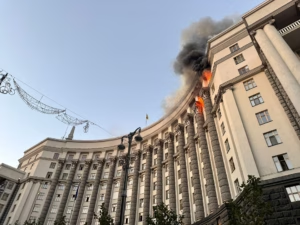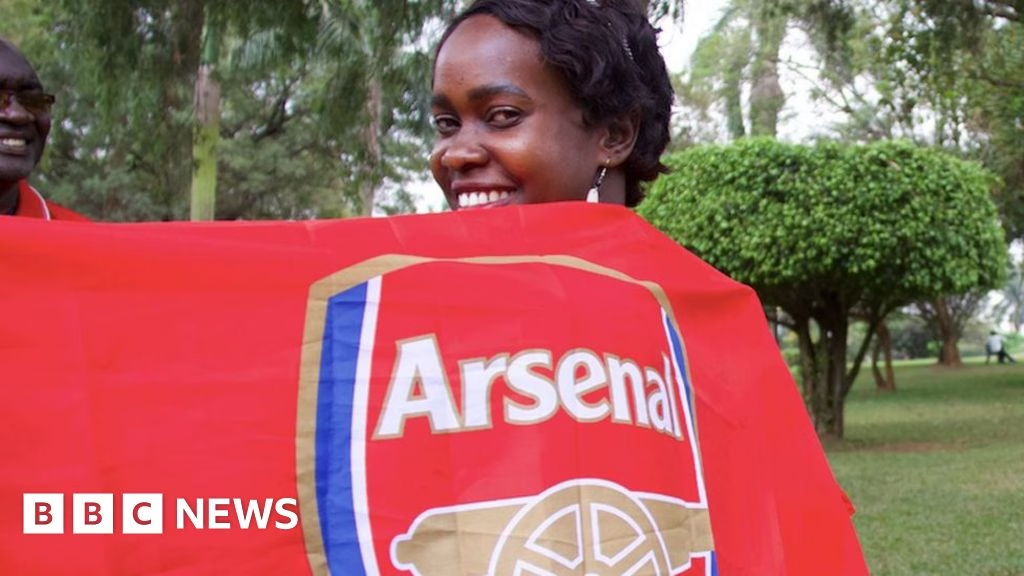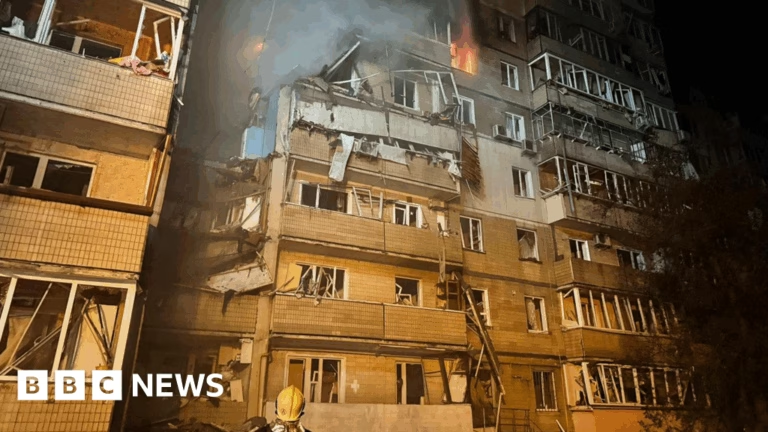BBC News, Kampala
live(55aff450-1707-11f0-b1b3-7358f8d35a35).webp) BBC / Wycliffe Muia
BBC / Wycliffe MuiaArsenal fans in Uganda partied well into the early hours this week, outside video halls and bars across the country, after their team’s stunning victory over Real Madrid.
The north London-based team won 3-0, at home, in the first leg of the Champions League quarter-final stage.
Such was the passion, the joy and the adulation shown to midfielder Declan Rice and his free kicks, you would be forgiven for thinking Arsenal was homegrown.
Whenever the club play, the East African nation knows about it. Alongside Manchester United, they are one of the English Premier League (EPL) teams with the biggest support in the country.
Church services, packed with fans decked in the Gunners’ red and white colours, have been held before big matches – with prayers offered up for a side that sometimes looks as though it needs divine assistance.
The passion for Arsenal and other English clubs has spawned an entire industry in Uganda, with shops and vendors selling jerseys and bigger companies targeting their advertising around the results, while for sports betting companies it is massive business.
live(2a5f2310-1717-11f0-8a1e-3ff815141b98).webp) Jacobs Odongo Seaman
Jacobs Odongo Seaman“I have covered football across Africa for many years and I can tell you without a doubt that the soccer enthusiasm in Uganda is on another level,” veteran sports journalist Isaac Mumema told the BBC.
For Swale Suleiman, a Manchester United fan and mechanic I met at a garage in the capital, Kampala, the excitement lies in the fact that EPL matches are competitive, entertaining and sometimes unpredictable and even a “small team can cause an upset”.
Ugandan fan clubs have been set up for all the top English sides. WhatsApp groups keep the debates going beyond halls and bars.
But Arsenal fans seem to take it to another level – some have even been arrested for holding victory parades without police notice after winning big matches.
However, this type of fandom also has a much uglier side, with the love for the game sometimes turning to deadly violence as tempers flare between rival supporters.
“Our people naturally get attached to something wholeheartedly and Ugandans really love football,” Uganda Football Coaches Association (UFCA) chairman Stone Kyambadde told the BBC.
“This soccer fanaticism has even grown stronger with the young generation because they watch the English Premier League from anywhere,” he said.
They can keep abreast of scores on their phones, but it is mainly a communal event and even the most remote village will have a makeshift video hall where fans will pack in to watch matches.
But it was for a funeral that villagers near Lake Victoria gathered last December, to bury a 30-year-old carpenter who was shot dead while celebrating Arsenal’s victory over Manchester United.
Speaker after speaker lamented the loss of John Senyange, who had been a Gunner all his life.
He had been watching the match in a video hall in the town of Lukaya – and when spontaneous cheering erupted from Arsenal fans after the final whistle, it upset their rivals, including a security guard, who reportedly pulled the trigger.
Earlier in the season, about 300km (186 miles) away in the south-western area of Kabale, Manchester United fan Benjamin Ndyamuhaki was stabbed to death by an Arsenal supporter after the two argued over the results of the epic clash between Arsenal and Liverpool.
In 2023, there were four Premiership-related deaths in different parts of the country – two Arsenal fans were killed by Man Utd supporters, a fan died in mysterious circumstances after Man Utd were trounced 7-0 by Liverpool and another man died from stab wounds after trying to intervene in a fight after Arsenal lost to Man Utd.
Football violence in Uganda dates back to the 1980s when local games were characterised by stone-throwing and fistfights between rival fans.
“There has always been cases of violence whenever Express FC and SC Villa – the two main local teams in Uganda – have a major derby,” sports scientist Lumbuye Linika told me at a football pitch in Kampala.
But things have become much worse – a situation experts blame on fanaticism fuelled by gambling, with many men trying to earn their living by placing bets.
In a tragic case several years ago, police said a man killed himself with poison after losing money in a bet.
With the rise of online gambling, it just takes a second to place a bet via an app on your phone which brings the hope of winning big coupled with bragging rights.
Gaming companies have also taken advantage of the Ugandan obsession with the EPL, setting up viewing centres where fans can watch games and place their bets.
This is where the trouble often brews – with rival fans teasing each other when their bets fail.
(live)(de59b190-1709-11f0-b1b3-7358f8d35a35).webp) AFP
AFP“With limited job opportunities, many football fans are turning to betting as a way to earn quick money,” said Amos Kalwegira, who stopped to chat to me one Monday morning on a street in Kampala.
“This has become an intense emotional investment which often quickly turns into aggression when soccer results aren’t favourable.”
For Mr Linika this is all proving corrosive: “Football should make us happy and Western soccer is supposed to be a form of entertainment but here in Uganda we have turned it to be a way of earning a livelihood, spoiling the fun.”
But Collins Bongomin, a senior officer in one of Uganda’s betting companies, said the industry should not be blamed for football violence.
“People just lack sufficient knowledge on managing expectations and anger,” he told the BBC, noting industry efforts to encourage responsible gambling.
With more than 2,000 betting shops across the country, it is also proving lucrative for the government, which collected about $50m (£40m) in tax revenue from gambling last year, according to local media.
(live)(7c722dc0-089d-11ef-b9d8-4f52aeb147d).webp) Getty Images/BBC
Getty Images/BBC








